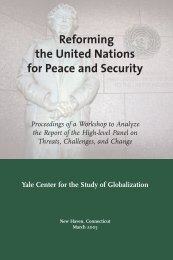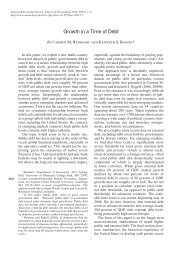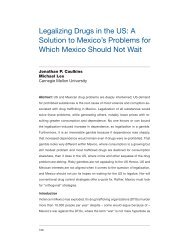The collapse of global trade, murky protectionism, and the crisis:
The collapse of global trade, murky protectionism, and the crisis:
The collapse of global trade, murky protectionism, and the crisis:
Create successful ePaper yourself
Turn your PDF publications into a flip-book with our unique Google optimized e-Paper software.
17. Public procurement: focus on people,<br />
value for money <strong>and</strong> systemic integrity,<br />
not <strong>protectionism</strong><br />
Steven L. Schooner <strong>and</strong> Christopher R. Yukins<br />
George Washington University<br />
As nations come to grips with <strong>the</strong> <strong>global</strong> <strong>crisis</strong>, proper management <strong>of</strong> government<br />
procurement systems is critical. Massive fiscal stimulus packages mean that government<br />
spending is set to exp<strong>and</strong> significantly. States must manage <strong>the</strong>se expenditures<br />
wisely to obtain value for <strong>the</strong>ir money – a result that is essential to sustaining public<br />
<strong>and</strong> private confidence that public funds are being well spent.<br />
Demonstrate responsible fiscal stewardship<br />
Confidence in government, particularly <strong>the</strong> government's ability to be a good fiscal<br />
steward, is critical as <strong>the</strong> <strong>global</strong> economy struggles to recover from <strong>the</strong> present economic<br />
<strong>crisis</strong>. <strong>The</strong> stakes are enormous, <strong>and</strong> <strong>the</strong>y will only become more so.<br />
Throughout this decade, <strong>the</strong> increased volume <strong>of</strong> public procurement spending has<br />
been remarkable. From 1995 to 2006, public procurement in <strong>the</strong> EU more than doubled<br />
as a percentage <strong>of</strong> GDP, <strong>and</strong> US federal procurement grew five times faster than<br />
<strong>the</strong> rate <strong>of</strong> inflation. Given <strong>the</strong> massive stimulus spending, public procurement's<br />
share <strong>of</strong> total economic activity should rise dramatically.<br />
To meet <strong>the</strong>ir goal <strong>of</strong> stimulating sagging economies, stimulus packages require<br />
rapid expenditure <strong>of</strong> government funds. But history is replete with examples – during<br />
times <strong>of</strong> war <strong>and</strong>/or natural disasters – that demonstrate that expedited spending, particularly<br />
<strong>of</strong> dramatically increased sums <strong>of</strong> money, leads to suboptimal outcomes.<br />
States tend to pay too much for what <strong>the</strong>y buy <strong>and</strong>, all too <strong>of</strong>ten, experience greater<br />
levels <strong>of</strong> wasteful spending, inefficient outcomes (<strong>of</strong>ten in <strong>the</strong> form <strong>of</strong> paying abovemarket<br />
prices for, in <strong>the</strong> worst-case-scenario, subst<strong>and</strong>ard goods <strong>and</strong> services), <strong>and</strong>,<br />
alas, fraud <strong>and</strong> corruption. As a result, public confidence in government suffers (at a<br />
time when confidence in government is particularly vital).<br />
Derailing <strong>the</strong> "Buy American" express train: a cautionary tale<br />
Economic stress <strong>and</strong> stimulus spending can bring out <strong>protectionism</strong>. Here <strong>the</strong> US's<br />
stimulus package <strong>of</strong>fers a cautionary tale.<br />
As legislators rushed to inject a nearly $800 billion into a stagnating economy, special<br />
interests dem<strong>and</strong>ed that stimulus-funded public works projects use only domestic<br />
iron, steel, <strong>and</strong> manufactured goods. <strong>The</strong>se "Buy American" stimulus provisions<br />
would have violated, at worst, <strong>the</strong> letter <strong>and</strong>, at best, <strong>the</strong> spirit <strong>of</strong> many <strong>trade</strong> agreements,<br />
which commit <strong>the</strong> US (<strong>and</strong> <strong>the</strong> majority <strong>of</strong> its constituent states) to non-dis-<br />
87





